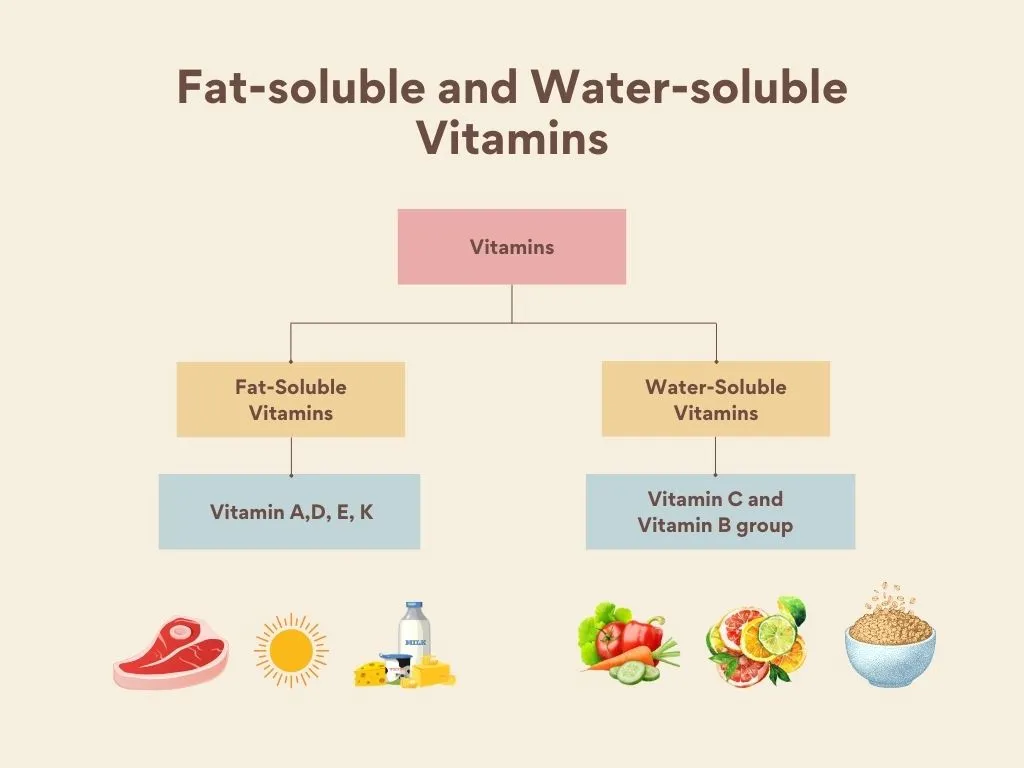Vitamins are essential organic compounds that our bodies need to function correctly. They play a crucial role in maintaining overall health by supporting various bodily processes. Without an adequate intake of vitamins, our bodies cannot perform at their best, leading to deficiencies and health issues. This article explores what vitamins are, their roles, sources, and the importance of maintaining balanced vitamin levels.
What Are Vitamins?
Vitamins are organic molecules that our bodies require in small quantities for proper metabolic function. Discovered in the early 20th century, vitamins were initially identified as vital substances necessary to prevent diseases like scurvy and rickets. They are classified into two categories based on their solubility: fat-soluble and water-soluble vitamins.
The Role of Vitamins in the Body
Vitamins serve as coenzymes, antioxidants, and regulators of mineral metabolism and cell growth. They are crucial for various physiological functions, including energy production, immune response, and cellular repair. Each vitamin has specific roles, contributing uniquely to our health.
Detailed Breakdown of Each Vitamin

Fat-Soluble Vitamins:
- Vitamin A (Retinol)
- Functions: Essential for vision, immune function, and skin health.
- Sources: Carrots, sweet potatoes, spinach, liver.
- Vitamin D (Calciferol)
- Functions: Crucial for bone health and calcium absorption.
- Sources: Sunlight, fortified dairy products, fatty fish.
- Vitamin E (Tocopherol)
- Functions: Acts as an antioxidant, protecting cells from damage.
- Sources: Nuts, seeds, spinach, broccoli.
- Vitamin K (Phylloquinone and Menaquinone)
- Functions: Necessary for blood clotting and bone metabolism.
- Sources: Leafy greens, broccoli, Brussels sprouts.
Water-Soluble Vitamins:
- Vitamin B1 (Thiamine)
- Functions: Helps convert nutrients into energy and is essential for glucose metabolism.
- Sources: Whole grains, pork, fish, nuts.
- Vitamin B2 (Riboflavin)
- Functions: Plays a role in energy production and the metabolism of fats, drugs, and steroids.
- Sources: Eggs, green vegetables, milk, meat.
- Vitamin B3 (Niacin)
- Functions: Supports cellular metabolism and DNA repair.
- Sources: Poultry, fish, whole grains, peanuts.
- Vitamin B5 (Pantothenic Acid)
- Functions: Vital for the synthesis of coenzyme A, crucial for fatty acid metabolism.
- Sources: Chicken, beef, potatoes, oats.
- Vitamin B6 (Pyridoxine)
- Functions: Important for amino acid metabolism and red blood cell production.
- Sources: Chickpeas, bananas, tuna, salmon.
- Vitamin B7 (Biotin)
- Functions: Essential for carbohydrate and fat metabolism and regulating gene expression.
- Sources: Eggs, almonds, sweet potatoes, spinach.
- Vitamin B9 (Folate)
- Functions: Necessary for DNA synthesis and repair, critical during rapid growth periods like pregnancy.
- Sources: Leafy greens, legumes, nuts, fortified cereals.
- Vitamin B12 (Cobalamin)
- Functions: Important for nerve function, red blood cell formation, and DNA synthesis.
- Sources: Meat, dairy products, fortified cereals.
- Vitamin C (Ascorbic Acid)
- Functions: Acts as an antioxidant, supports the immune system, and is necessary for collagen synthesis.
- Sources: Citrus fruits, strawberries, bell peppers, broccoli.
Health Benefits of Vitamins
Vitamins provide numerous health benefits:
- Boosting the immune system: Vitamins like C and D enhance immune function.
- Maintaining healthy skin and hair: Vitamins A, C, and E contribute to skin health and hair growth.
- Supporting bone health: Vitamins D and K are essential for maintaining strong bones.
- Enhancing brain function and mental health: B vitamins, particularly B6, B9, and B12, support cognitive function and reduce the risk of neurodegenerative diseases.
Deficiency and Overdose: Risks and Symptoms
- Common vitamin deficiencies: Lack of vitamins can lead to various health issues, such as scurvy (Vitamin C deficiency), rickets (Vitamin D deficiency), and anemia (Vitamin B12 deficiency).
- Risks of vitamin overdose: Excessive intake of vitamins, particularly fat-soluble ones, can cause toxicity. For example, too much Vitamin A can lead to liver damage, while excessive Vitamin D can cause hypercalcemia.
- Balanced intake: It’s crucial to maintain a balanced intake of vitamins through diet and, if necessary, supplements.
How to Ensure Adequate Vitamin Intake
- Dietary sources: Consuming a varied diet rich in fruits, vegetables, whole grains, lean proteins, and dairy products ensures a good supply of vitamins.
- Role of supplements: Supplements can help bridge the gap when dietary intake is insufficient, but they should be used cautiously and preferably under medical advice.
- Tips for maintaining a balanced diet: Include a colorful variety of foods, focus on whole foods over processed ones, and consider fortified foods if needed.
Final Thoughts
Vitamins are indispensable for maintaining health and well-being. They support numerous bodily functions, from immune defense to energy production. Understanding the roles and sources of each vitamin helps ensure we meet our nutritional needs, ultimately leading to a healthier, more vibrant life. Monitoring and maintaining balanced vitamin levels through a nutritious diet and responsible supplementation is key to optimal health.